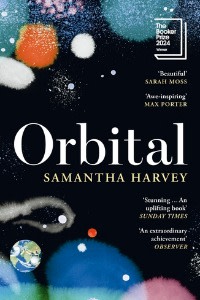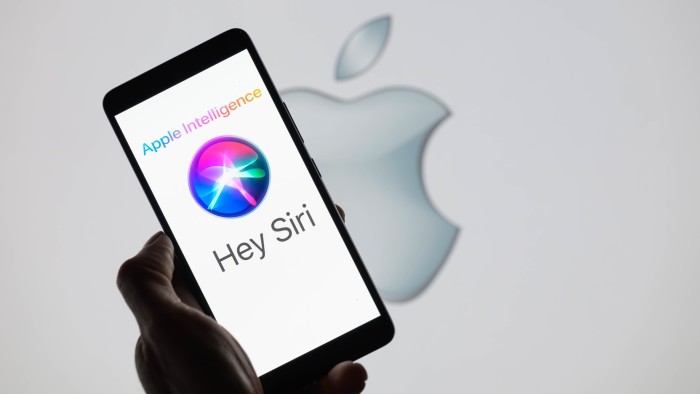If offered a free trip into space, Samantha Harvey says she would like to be “brave enough” to say yes — but then adds that in truth she’d probably be too scared to go.
The question is not as random as it may seem: 49-year-old Harvey has just won the prestigious Booker Prize for fiction for her novel Orbital, a story set aboard the International Space Station as it circles the Earth, unfurling along the way observations and meditations about the “suspended jewel” below and the preoccupations of the six humans on board “up there”.
Whatever her own trepidations about taking to the heavens, Harvey’s finely executed imagination of the reality of life suspended in low Earth orbit was found by the Booker judges to be “extraordinary” and “beautiful”.
The book, which came out a year ago, has already proven a hit with readers. The £50,000 award is set to spur sales further. Harvey, who was longlisted for the prize 15 years ago for her novel The Wilderness, is the first British author to win the Booker since 2020 and the first woman since 2019.
“I can’t even begin to process it. It’s just beyond anything that I hoped or imagined,” she says in quiet, precise tones when we meet the next morning. On the table between us stands “Iris”, the gilded Booker Prize trophy, surrounded by a generously filled bowl of fruit, a largely exhausted cafetière of coffee and bags of untouched pastries. “I’m utterly overwhelmed by it,” she adds.
In truth, Harvey says, the book is “more about Earth than about space”. She wanted to write something that felt “vaguely pastoral”, to find a way of writing about the Earth and its natural environment that captured a “feeling of connection but also a feeling of sorrow towards what we are doing to it”.
For that she needed an angle, which is what took her to space and the ISS. While she’s no “space nerd” — Harvey’s previous books have roamed very much in earthly terrain, from the impact of Alzheimer’s, filial duty, insomnia and the searing consequences of a love triangle — she says that she has always been interested in the perspective on Earth that space offers.
The ISS proved a perfect observation deck. Her fictional version of the space station is populated with its six humans — four men, two women; four western and Japanese astronauts, two Russian cosmonauts — who circle our planet, observing the “magnificent seemingly unbreakable majesty of the natural environment that is the planet Earth and also the enormous human impact we are having on it”. The book — at 136 pages, it is second-shortest to ever win the Booker — tracks them, and our planet, through a “normal” 24-hour day, which in the world of the ISS involves 16 orbits of Earth with 16 sunrises and 16 sunsets.
Threaded through the novel is a gathering typhoon whose progress towards its ultimate devastating impact in south-east Asia is observed in beguiling prose. “It’s the plot,” says Harvey almost teasingly, addressing one of the observations about Orbital that the story does not follow a narrative form or contain the conflict central in much conventional storytelling.
To imagine all this required deep dives into the Nasa and European Space Agency archives, and many hours on the ISS live feed. It helped that she worked on the book through lockdown. (Tellingly “almost nothing” of the Russian space programme is accessible.) “I love research,” says Harvey. “It opens a creative door.” Do enough research and you get the point “to feel confident enough to make things up”.

The result is a startling and acutely presented contrast between the cosmic and the quotidian. There are beautiful descriptive passages of the world below, looping weather systems, continents blurring — “Asia come and gone” — as the space station whizzes along at 17,500mph. The creation of our galaxy — “some cosmic clumping thumping clashing banging Wild West Shoot-out of rock and gas”— is given lyrical treatment. Meanwhile, up there are the daily routines and realities — bland dinners, uncleared dishes, recycled urine and everything velcroed into place — and thoughts about “home”.
Space is “the one remaining wilderness”, says Harvey. And yet few novelists engage with it, leaving it more to the writers of sci-fi or memoir-penning astronauts. She believes that space offers “a really strange place in the human psyche”, caught between the now “humdrum” of routine missions and rocket launches, and the “mythical” that lends itself to sci-fi. Yet we fail to grasp the reality that space has been a natural lived environment for humans for the last quarter of a century on the ISS.
The space station, which was launched in 1998, is one of the few places where Russia and the west are co-operating in a meaningful way. “It’s a symbol of an era that I think is passing, or maybe has already passed, one of post-cold war reconciliation and hope,” says. In Orbital she writes about the growing cracks in the shell of the ageing ISS. Meanwhile, Moscow has previously threatened to quit the project.
Harvey adds that the ISS also belongs to a passing era in human exploration of space, where the next phases will be about establishing a staging post on the Moon to support future missions to Mars. That will involve a shift away from a focus on “our planet”, circling and looking down on Earth, to looking “out”. As such, Harvey sees the ISS freighted with a deep sense of nostalgia.
The next chapter in space exploration is also set to have new authors. While the likes of Elon Musk and Jeff Bezos find no place in Orbital, there is a telling line when one of the characters ponders a media inquiry about “how we are writing the future of humanity”. The answer: “With the gilded pens of billionaires, I guess.”
Harvey worries about the shift to discovery driven by wealthy individuals rather than states. “I think we have an opportunity with space exploration to do things radically differently and we are not taking that opportunity. We are just repeating the same paradigm,” she says. “It is exploitative, the new frontier: whoever gets there first claims it.”
Meanwhile, “we are filling up low Earth orbit with junk that we have no way of disposing of. We’ve entirely trashed the field of space around our planet.”
As for her own life beyond Orbital, Harvey is just getting to grips with the relentless promotional schedule that awaits all Booker winners. Somewhat wistfully, she says that there is a love story of sorts that she began working on a while back and is “still taking shape in her mind” and that she is “desperate” to get back to writing.
“I feel that I can access a room in myself through writing that I cannot access in any other way,” she says. “And I kind of need to go back to that room quite often. At the same time, it’s the Booker Prize!”
Orbital by Samantha Harvey, Jonathan Cape £14.99, 136 pages
Frederick Studemann is the FT’s literary editor
Join our online book group on Facebook at FT Books Café and subscribe to our podcast Life & Art wherever you listen













































































































































































You must be logged in to post a comment Login